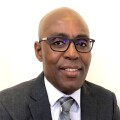In Senegal, the General Directorate of Social Action (Direction Générale de l’Action Sociale – DGAS) issues Equal Opportunity Cards to families in need of financial assistance. Among other benefits, card recipients will soon have access to free health care in public hospitals and health centers. A partnership between Special Olympics and the Senegalese Ministry of Health and Social Action ensured people with intellectual disabilities have access to this program. To date, over 300 Special Olympics athletes have signed up.
The partnership with the Ministry of Health and Social Action has also opened doors for Special Olympics Senegal to become a member of the Scientific Committee on Disability and to participate in the development and review of the National Disability Plan. This will ensure that the voice of people with intellectual disabilities is represented in the decision-making process.

Similarly, opportunities for access to follow-up care for persons with intellectual disabilities in Nigeria are being opened through a partnership between Special Olympics and the National Health Insurance Scheme (NHIS). During interviews conducted at health events, Special Olympics Nigeria learned that several parents of persons with intellectual disabilities are reluctant to pursue follow-up treatment, despite this being recommended during health screenings. This is due to long waiting periods at health care facilities and the high out-of-pocket cost of treatment. Most parents resort to self-medication or turn to traditional treatment. In 2018, Special Olympics Nigeria has partnered with the NHIS to offer affordable health insurance to individuals with intellectual disabilities, thus reducing the financial burden on parents and caregivers. The subsidized cost of treatment is ultimately making health care more accessible.
Through partnerships at local, national, regional and global levels, Special Olympics has significantly expanded opportunities for persons with intellectual disabilities to access health care. In Africa, partnerships with private, public and non-governmental organizations play a vital role in the roll-out of community-based health programming that ensures quality and greater reach.

Private sector partnerships are equally instrumental. Special Olympics Nigeria partnered with Max International to receive free dental and vision equipment to screen thousands of people with intellectual disabilities free of cost and on a regular basis.
Relatedly, Special Olympics Senegal has partnered with SOS Medecin, who have supported athlete health screenings with medical volunteers, equipment, training of athletes and families, follow-up care, and even cardiology screenings for the past ten years.
The importance and impact of partnerships cannot be understated. Collaborating across the public and private sectors expands opportunities for individuals with intellectual disabilities to live healthier lives, promotes the overall health of communities at large, and helps equalize access to health care for all.










